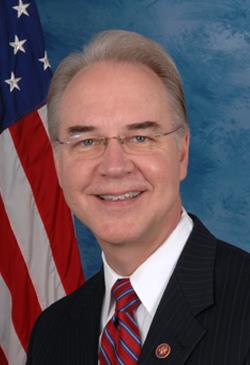As you complete your medical training and advance in your career as a physician, do you ever wonder where your career might take you beyond the exam room? In this new mini-series, we’re getting a glimpse of the jobs some physicians take on to support health care in the United States through nonclinical means.
Rep. Tom Price, MD, was first elected to represent Georgia’s 6th district in November 2004. Prior to going to Washington, Dr. Price served four terms in the Georgia State Senate, including two terms as minority whip and one term as majority leader. Dr. Price worked in private practice as an orthopaedic surgeon for nearly 20 years.
What led you to run for public office?
This was never my grand plan. However, at some point early in my career, I recognized that there were a whole lot of people in our state capitol and in Washington who were making decisions about what I could do for and with my patients who never practiced medicine or took care of a patient. That knowledge, and the concerns of my patients, led me into public service. These were non-medical people making medical decisions, and I thought that was not appropriate or needed.
How did your clinical background equip you to take on your role as a member of Congress?
The expertise and training we undergo as physicians, I believe, is ideally suited to public service. In the political arena, folks are most interested in someone who listens and appreciates the big picture. If that doesn’t describe doctors, I don’t know what does. Our challenge is to bring the scientific method of problem solving to the public service arena. We’d all be better off.
What do you find the most rewarding about being a member of Congress? What have you found the most challenging or surprising?
Being able to participate in solving, and have an opportunity to help move, big problems is a remarkable privilege. There are so many challenges confronting us as a nation. Working with colleagues from different parts of the country with unique and diverse points of view is tremendously rewarding. One of the more challenging aspects of this job is the patience that’s required when it comes to getting real solutions enacted. The legislative process, by design, can be laboriously extended, even when folks are in general agreement on how to proceed. That took some getting used to after coming from a profession where quite often, by necessity, decisions are made quickly and a treatment plan is put into action shortly after the patient comes through the door.
What advice would you give medical residents and young physicians who are interested in running for public office in the future?
Find your passion in medicine and pursue it. There is no greater honor or joy that one could ever gain in life than in caring for one's fellow man. If public service calls you, plant yourself firmly in a community and pour yourself into the issues that confront folks locally every day. Then, and only then, will you be able to feel the personal concerns and frustrations of your fellow citizens—and then, and only then, will you be able to gain their trust to have them consider you as a person who might possibly be able to represent their interests at any level. I’d be more than pleased to discuss any one individual’s personal goals with them as we move forward.




